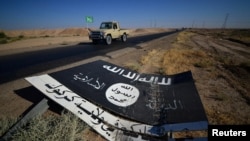Islamic State fighters are trying to make their way to parts of Syria controlled by President Bashar al-Assad, where they are apparently able to operate freely.
“We are seeing the movement of limited numbers of ISIS militants westwards,” said British Maj. Gen. Felix Gedney, deputy commander of Strategy and Support for the U.S.-backed coalition to defeat the Islamic State terror group.
“They seem to be moving with impunity through regime-held territory,” Gedney said of the Islamic State fighters, during a briefing from Baghdad Wednesday.
“The regime is either unwilling or unable to defeat Daesh within their borders,” he added, using the Arabic acronym for the terror group.
Estimates
The coalition estimates there are now fewer than 1,000 IS fighters left in parts of Iraq and Syria in which the coalition and its partners operate, down from estimates of fewer than 3,000 just three weeks ago.
According to coalition officials, just how many IS fighters have managed to escape to regime-held parts of Syria is “impossible to say,” though coalition partners are encountering small numbers of fleeing fighters on a routine basis.
“I can’t tell you that none have managed to get through our grip, but I would tell you not many,” Gedney said.
Still, U.S. and coalition officials remain adamant that IS remains a threat and will try to mount insurgencies in both Iraq and Syria, as well as continue to plot attacks against Western countries.
They also caution that IS has repeatedly shown the ability to adapt to changing circumstances, saying there are numerous indications the terror group has successfully modified its operating model even in the past year.
And they say declarations of victory over IS, by Syria and Russia in particular, have been premature.
“The Syrian regime has failed to demonstrate to prevent the resurgence of ISIS on their own soil,” Maj. Gen. Gedney said Wednesday.
Progress against IS
And even in areas where Syrian forces have intensified their efforts against IS, the coalition says progress has been, at best, fleeting.
“We’ve clearly seen a lot of operations by pro-regime forces, Russian-backed Syrian forces over to the east of the [Euphrates] river,” Gedney said. “We’ve questioned the effectiveness of some of those operations.”
For their part, Russian officials have been trying to put the blame on Washington, accusing U.S. forces of training Islamic State militants at a military base at Tanf, near a strategic border crossing with Iraq, in a bid to further destabilize Syria.
“They are in reality being trained there,” General Valery Gerasimov, the chief of the Russian General Staff, told the Komsomolskaya Pravda newspaper Wednesday.
“They are practically Islamic State,” Gerasimov said. “But after they are worked with, they change their spots and take on another name. Their task is to destabilize the situation.”
U.S. officials have rejected such allegations, and say Syria and Russia must do more to wipe out IS in areas still controlled by the regime.
“We’ve got no intention to operate in areas that are currently held by the [Assad] regime,” Gedney said.
Some material in this report is from Reuters news agency.






